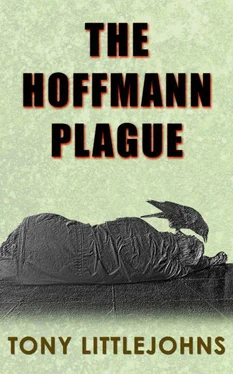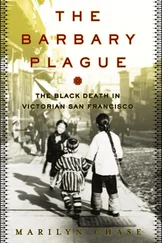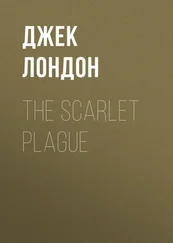The guy paused for a second as if trying to take it all in, then spun around and ran for the exit. In his haste and poor state of health, he tripped and fell headlong into the plate glass. It didn’t shatter as it was safety glass, but his head snapped back at an acute angle and he crumpled to the floor, his neck broken. He lay there twitching for a few seconds, then became still.
He picked up his bolt cutters, stepped carefully around the guy and out the door. As he walked away he cursed himself for being so careless; just because he hadn’t seen other people didn’t mean there weren’t some around. Also, there wasn’t anything in the rucksack worth dying for and he could have handed it over. The hell with that! he thought. No one’s going to take what’s mine. The fact that he’d nearly had to use the machete on a person shook him up, and then a line from some old film came to mind: Get busy living, or get busy dying.
He hurried onwards to Halfords, keeping the bolt cutters in his left hand rather than putting them in his rucksack. They were heavy and could slow him down in a fight-or-flight situation, and that way he could just drop them if need be. He looked at Tesco and wondered about going in for a look around, but now wasn’t the time; he just wanted to get home.
Halfords’ doors were open and he walked in with more caution than he’d shown at B&Q. He went upstairs to the bike section and soon found what he wanted; a universal bike rack and paniers to fit it. Downstairs in the camping section he found some collapsible water containers in various sizes, which would be perfect for putting inside the paniers. As he was leaving he noticed some small petrol and diesel-powered generators on a shelf; the kind people used with caravans, etc. That made him think; electricity – light – heat. He paused for a second, took his notebook out of his coat pocket and scrawled genny! Putting the notebook back in his pocket, he found a screwed-up £10 note in there. As he passed the checkouts he put the note by the till in payment for his goods and smiled to himself.
He was happy to get back on the coastal path and stopped briefly at the bottom of Galley Hill, just long enough for a drink of water and a few flapjacks. Instead of going back over the hill, he skirted it and walked along the beach path at its foot, looking at plants. He collected a few likely-looking samples, and some more on the way back along the seafront.
Feeling pleased to get home, he made some coffee and a late lunch. For the remaining afternoon he worked on fitting the rack and paniers to his bike and adapting it to his needs. He made a wooden platform, as large as was practical, and fixed it securely to the rack with bolts, brackets and wingnuts. He incorporated mounting points for bungees or straps so he could tie things securely onto it, and was pleased with the end result. A small trailer would be of more use probably, but he thought it unlikely that he would find one; maybe that was something to build at a later time.
That evening after his supper, he sipped a whisky while reading by gas-lamp through books on plants and survival, and was delighted to discover that two of the specimens he’d collected were edible, which was great news. He was unsure about the others; their pictures were ambiguous, so he decided to leave them for now. Unless he could make a positive identification he couldn’t risk eating them and maybe getting sick. The large cabbage-like plant he identified as sea kale, and found that the whole plant was edible, including the roots, which could even be eaten raw. The other was sea beet, the leaves of which could be eaten like spinach, and also the root. Interestingly, he found that sea beet was the genetic ancestor of modern beetroot, sugar beet, chards and spinach; all of which had been grown from selective cultivation over the years. Looking through the books, he was also reminded that common plants such as dandelion leaves and nettles were also abundant, nutrient-rich and easily gathered.
On the rooftop of her building, the woman stood by the parapet wrapped in a blanket, staring out over the sea after eating a rather cheerless meal. She longed for fresh food and living conditions that were more suitable. Her flat was secure enough, and the rooftop had good views along the coast, but climbing the stairs laden with things was becoming a burden. Added to which, she needed somewhere suitable for lighting fires for cooking and warmth, and also for growing food. She decided it was time to look for somewhere else to live.
She had seen the smoke earlier in the day, when the man had burnt the corpse at the angling club, and had wondered what it meant. Although the man-in-the-hat had been going that way, she had no way of knowing whether it was anything to do with him. She went to bed worrying about many things and couldn’t sleep.
He put the books down and sat there fretting for a while. The encounter with the man in B&Q had shaken him and he wondered if that would be the norm with any other survivors he might meet. He felt scared and anxious about his situation, as was to be expected. He had been wondering for many weeks whether he should make trips into Hastings and Eastbourne, to see what the situation was in those towns and if there were others he could make contact with. From TV and radio broadcasts before the services had failed, things were likely to be the same as Bexhill; with the rest of the UK probably the same, too. He didn’t feel inclined to go to those places, risking potentially dangerous encounters, armed only with a machete and a hammer. Guns of some sort would be useful and comforting to have, but he had no idea where he might find any. He felt rather pleased with his day for the first time in ages and went to bed happy with his achievements, though he lay awake for a while thinking about things, unable to shut down.
The shock, the horror, and the speed at which it had happened had been difficult enough to deal with, but on top of that he’d had the deaths of his mother, his brother and sister and their families, too. As for the rest of his extended family, he had no idea if any were still alive up north. The pandemic had spread in no time and society, communications and infrastructure had broken down rapidly. In a relatively short space of time after the first cases, the utilities were becoming intermittent as staff levels fell due to the disease. All systems were automated, of course, and some lasted longer than others, but eventually they had all collapsed, and far sooner than he would have thought possible.
The first cases had appeared in Glasgow and had spread at an alarming rate. It was thought to have come from eastern Asia or maybe Africa, though they didn’t know for sure. At first it was reported, incorrectly, as a new strain of influenza; some type of avian flu maybe. They soon discovered they were wrong and that it was a bacterium rather than a virus. A German doctor named Dirk Hoffmann, who worked at Glasgow’s Queen Elizabeth University Hospital, was the first to discover what the disease was.
It was a new strain of pneumonic plague; a mutation of the Yersinia pestis bacterium that had caused the Black Death of the fourteenth century, with continued outbreaks for around four hundred years. Most people didn’t know that, far from being extinct, plague bacteria had produced small, irregular outbreaks of bubonic or pneumonic plague around the world throughout the twentieth century and into the twenty-first, even in North America. If caught early enough it could usually be treated with antibiotics, which drastically reduced the likelihood of death. Pneumonic plague was the rarer of the two, and usually developed as a result of bubonic plague. Antibiotics and modern standards of hygiene had stopped those small outbreaks from spreading and becoming epidemics or pandemics. A few new strains had been discovered in recent years, though, that showed resistance to some antibiotics.
Читать дальше












